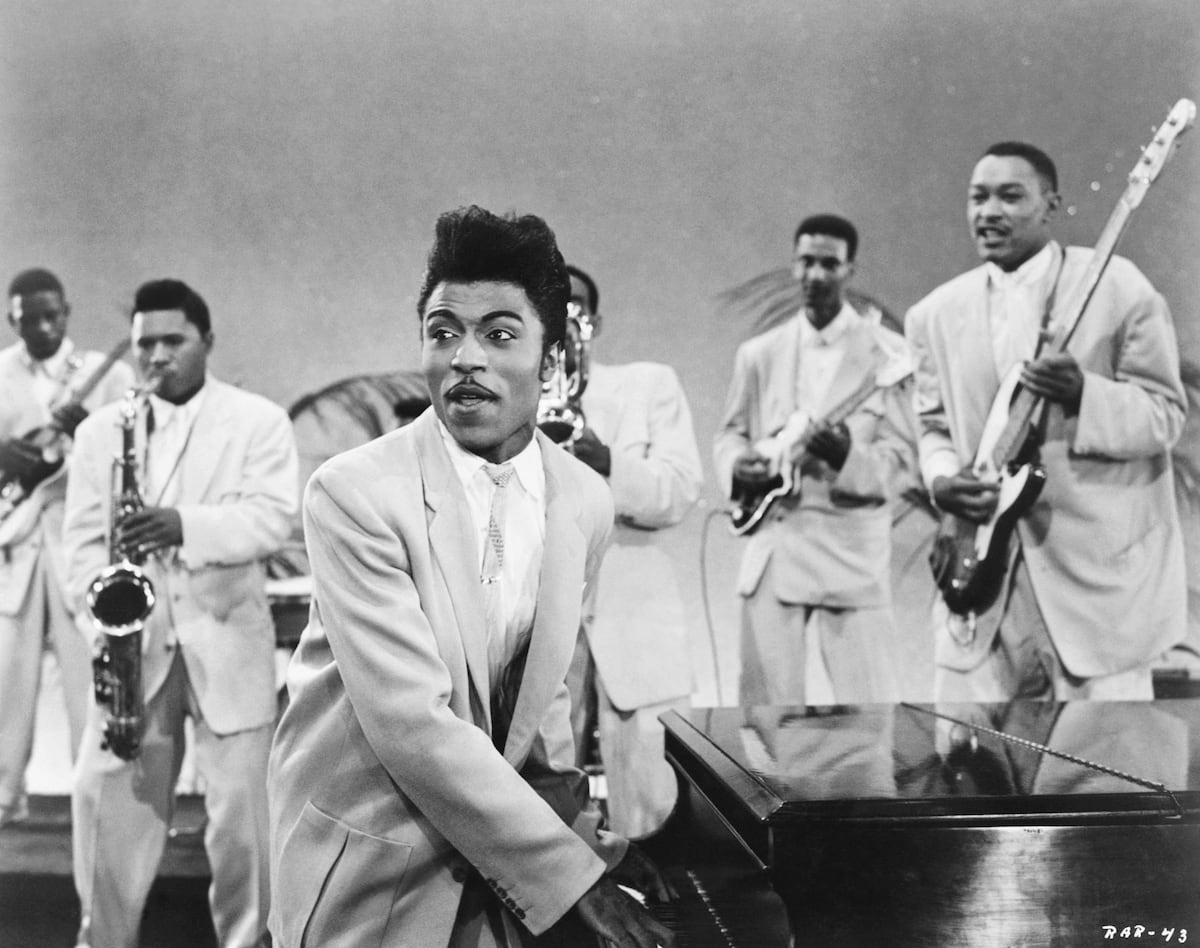There are many stories and rumors behind the songs of the rock 'n' roll star who died this weekend at the age of 87, whose songs won the graves of the greatest - Elvis, The Beatles and more
Colorful, happy and proud. Little Richard
Photo:
AP
It is said that imitation is the most honest form of compliment. According to this, if ever a person walked around the world with his profile picture under the "flattered" value in the million, then it is Little Richard, who passed away last weekend at 87. As minimal and compact as he claims to be, Richard was the kind of artist whose historical role was A breakthrough - musical, textual, stylistic, racial and even sexual, for a whole generation of rock 'n' roll creators and artists. Singers who took what he did, included it, or just took ownership of it. It worked great for Elvis, the Beatles, the Clearwater Clearwater Revival, the Animels, and Pat Boone. Richard, a colorful, happy but proud man, is also annoying at times, especially when the remake of his songs sometimes bypassed his sales.
With the passing of one of the most iconic names in Rock'n'Roll, a true legend that broke the conventions of rhythm, lyric, energy and melody, we returned to the stories behind three of his biggest hits. Even if Lennon, McCartney or Elvis made big names out of him, at least in terms of sparking the spark that sparked the puffin rock 'n' roll blast - Little Richard was the greatest of them all.
"Tutti Frutti"
This may be the first song that comes to mind when thinking of Little Richard, and some may argue that this is also the first big rock 'n' roll song. They are right, by the way. Because "Tootie Prutti," written by Richard and Dorothy Lavosteri, came out in 1955 and through a combination of dizzying rhythm, catchy lyrics and catchy melody, was the template upon which many songs of the singer were built, as were many other hits in the genre that became popular in those years. .
But before we get to the source of the song, a little about the most familiar lines out of it and what the hell are they saying. Let us begin, however, with the clarification that the term "toti proti" refers to homosexuality. charming. The original lyrics were, in a free but fairly faithful translation of the original: "Totti Peroti, good booty. If it doesn't come in, not forcibly. You can lubricate it, make it easy." Later, they were changed to Tooti Prutti, or Rotti, and then wondered what "Or Rotti" was, it was said to be a "peptic slang" for the term "all night."
According to legend, even by the mid-1950s, little Richard was already signed to a record label In 1955, he sent his demo tape to "Specialty Records," and after his potential recognized it, he was invited to a recording session in New Orleans, this time surrounded by musicians and a producer assigned to him by Helabel. He became frustrated that he felt that something of his wild spirit was not really reflected in the recordings. During the lunch break, while playing another song he was trying to record, which he performed regularly in his South American shows, record producer Robert "Bumps" Blackwell recognized that it was a hit, but realized that to make it such he would have to change slightly the non-lyrics Who knows how implicit Richard wrote them, and Dorothy entered the previously mentioned Busty here for softening the lyrics, which, by the way, claims full credit for the lyrics, with complete refutation of the whole story you just read here.
"Little Richard did not write a single line on Tootie Prouty," she once said in an interview. "I'll tell you exactly how I came to write it. My girlfriend and I loved going to town and buying ourselves ice cream. One day we saw that there was a new ice cream flavor called 'Totti Prutti.' I immediately thought to myself, 'Wow, this is a great idea for a song' and I kept it in my head By the time I got to the recording studio that day (where Richard introduced what she claims was Tutti Prutti's tune.) No matter which version you chose to believe, it's hard to deny the fact that this is the iconic rock 'n' roll classic of all. The world in general, and not accidentally won the graves of a host of artists of the genre - the most prominent of which were of course the Beatles and Elvis Presley. Hours name "Tutti Frutti" is "all fruit" in Italian. And about the "ah WAP it came to his nose Oh whoop if boom" - it is no more than a verbal demonstration of crossing drums as Domain by Richard.
Pat Boone's version
Elvis's version
"Lucille"
If "Tooty Prutty" was our breakthrough friend's breakout song, then "Lucille" that came out in 1957 was one of the songs that promised he was much more than a single hit singer. Originally, the song was written two years earlier as a ballad called "Directly From My Heart," but in the two years since it was written, Richard has become a huge star, and in order to continue his hit sequence, he decided to continue using the formula that made him a sensation. To that end, he increased the tempo of the song and changed its style, which would be more suited to the musician's current incarnation, an incarnation that also included naming women for his songs, much like the mysterious Lucille from the song, probably also mysterious to Richard himself.
"I don't know what my inspiration was in writing this song," he said in an interview with Rolling Stone magazine in 1970. "Maybe that was the beat." In an interview with Mojo magazine in 1999, he said: "The effects and rhythm you hear in my songs I got from trains that would pass by my house. Like, for example, 'Lucille', which came from the train sound - Dadaades Dada Dada Dada." Now everything makes sense. Given that Richard was not considered too private and used to share different anecdotes from his life, there is a firm foundation to conclude that Lucille from the song is not based on any real woman or man in the eccentric singer's life.
Experts from Richard argue that if there was any Lucille in his life, it was his love for Lee Angel, or his mentor Steve Reader Jr., who performed under the stage name "Escrita." Like other huge hits by Richard, "Lucille" also had cover versions. From names like Everley Brothers, Deep Purple, Van Halen, Johnny Winter, Otis Redding and again - The Beatles. The Blues Legend of BBC King took the tribute to Lucille one step further (or maybe back?) And called his guitar by that name.
The Beatles version
• Priscilla Presley: "Elvis committed suicide"
• Docs on Elvis: must-have for every fan
• May "Lord of the Rings" will direct a movie about the Beatles
"Long Tall Sally"
As has been mentioned many times here, Richard's poems have quickly become a part of other colleagues. Fulfilled if it was the profit-making standard of the last few decades, in which to perform Kaver's song it was customary to wait a number of years, but in the 1950s it was hard to wait for inspiration, and cover versions of fresh hits were quite common. Especially in the case of "Totti Prutti", which was covered only a few months after its departure. While this is a great compliment to the songwriter (who also created bad royalties at all), it also makes his performance comparable, places him in competition and sometimes robs him of his credit. Pat Boone's version of "Tootie Prutty" came in 12th in the pop chorus parade that year, and Richards and the label's "Specialty" label decided that it didn't fit all the songs and cabaret sales that are more familiar with the original. In response, they decided to write a song at a fast pace, so Boone couldn't renew it himself.
Thus was born the "long and tall Sally" (what's the difference between long and high? What's that important?), The little Richard classic that came out in 1956 and became the best selling CD of "Specialty". According to some theories, Sally was a transgender Richard knew. He himself claimed it was his family's affection for the bitter drop (Richard said she always claimed to be cool and drank whiskey throughout the day). The singer further described her as "tall and ugly, with only two teeth and squinting". Without a doubt, the material from which classics are created.
Pat Boone really couldn't sing Richard's rhythm, but insisted and released his own version of this song, "Cleaner" and Slower, which was easier to digest for a white audience, exactly the crowd that had trouble dealing with frantic Richard. Is there a whiter line than the one you just read here? probably not. Despite this, Boone's version did not work as well as the original one. Another success of the song is its ability to evade various radiophonic restrictions and censors, thanks to its speed. An NBC senior was once quoted as saying "How can I reject him if I can't even understand him?".
The Beatles version









